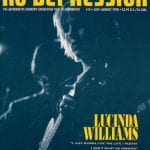Randy Scruggs – Pick your friends
At some point it comes down to who you know. Not inherently a bad thing, that; music, like life, has much to do with trust and the invisible certainties that link and separate strangers. And between them, Randy Scruggs and Jerry Douglas know and have played with just about everybody at the near and far reaches of country music since the 1970s. Which will explain the casts assembled on Scruggs’ new Crown Of Jewels (Reprise) and Douglas’ Restless On The Farm (Sugar Hill).
Scruggs and Douglas are mostly supporting players, a thoroughly honorable (not to mention essential) calling. One follows their careers through the small print on album packages, and the trophies they are awarded. Credentials, then:
Earl Scruggs’ middle son began taking guest spots with Flatt & Scruggs at nine, and was recording with them at 13. When the two patriarchs separated in 1969, Randy Scruggs became a featured player in the rock-inflected (hence, controversial) Earl Scruggs Revue. As a writer or co-writer, he has racked up #1 hits with Billy Joe Royal, Earl Thomas Conley and Deana Carter. He has produced everyone from Sawyer Brown to Iris DeMent, and has played guitar on an equally broad array of sessions.
Ohio-born Jerry Douglas took up mandolin at five, then switched to dobro, a choice that has served him and countless vocalists well. Early stints with the Country Gentlemen and J.D. Crowe led to formation with Ricky Skaggs of Boone Creek, a mid-late ’70s band that released two albums. When Skaggs went to work for Emmylou Harris, Douglas became one of Nashville’s premier session players, and played with the Whites for six years. At present he has taken the dobro chair for Alison Krauss & Union Station, among other projects.
Who they know, then. Guests on Randy Scruggs’ album include Vince Gill, Mary Chapin Carpenter, Travis Tritt (on Pure Prairie League’s “Amie”), Bruce Hornsby (the title track), John Prine (on Steve Goodman’s “City Of New Orleans”), Emmylou Harris and Iris DeMent (dueting on “Wildwood Flower”), Earl Scruggs and Jerry Douglas (“Lonesome Ruben”), Joan Osborne, Rosanne Cash, Trisha Yearwood, Marty Stuart, Roger McGuinn, Sam Bush, and others.
Douglas, recording over a shorter period of time (and on an indie budget), worked with a smaller ensemble that includes Tim O’Brien, Sonny Landreth, Sam Bush, Steve Earle, Edgar Meyer, Maura O’Connell, Bela Fleck, and John Cowan.
And each other, they know each other.
JERRY DOUGLAS: One of the pivotal influences in me becoming a musician in the first place was Earl Scruggs, Randy’s father, and the song that really got me was called “Randy Lynn Rag”. It was the first song that I really heard, and went, “I want to play that.” There he is, sitting there.
RANDY SCRUGGS: I appreciate that. And I think I’ve never heard that before.
JD: I’ve never said that before.
RS: I always felt I had to really learn that song and be able to perform it, because at some point someone would say, “There’s a song named after you…”
JD: Was that pressure?
RS: It could have been a slightly simpler song. (laughter)
JD: How would you have changed that song?
RS: Might have been a simpler song; maybe a little slower. Yeah, that’s it (fingers notes in the air). No, no, I mean, obviously, that was an honor. I’m really honored by that, and I’m really honored to be with you today.
JD: Well, we’re friends. (laughter)
RS: I played on the original Will The Circle Be Unbroken album [United Artists, 1972]. When they were starting to discuss making Volume Two [Universal, 1989], I had a call about the possibility of producing the record. I went in and met with the Dirt Band and discussed what we hoped that it would do, because any time you have a follow-up…you hope for something that’s going to be as creative and have as much long-lasting effect as the first one. And from the early meeting, when we talked about two or three key musicians, Jerry was the very first person we talked about, Jerry and Mark O’Connor. And to me in so many ways he really carried that project and helped make that happen…
JD: Thank you.
RS: …obviously along with the help of the Dirt Band.
JD: That’s the longest gig I’ve ever had. I mean, studio gig. We did two weeks where we’d just come in and sit down in the same chair and be oblivious to whatever was going on around you — because they were filming the whole thing — so we just kind of tuned out the cameras and had fun, joked around, said a lot of things off the top of our head (laughs). Which maybe we shouldn’t have said, but we did, and there they were.




